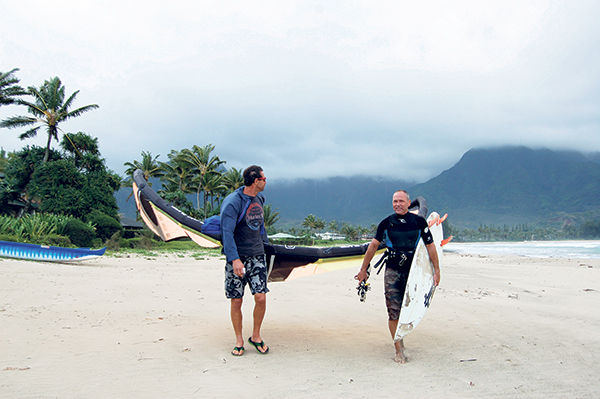HANALEI — When he spent his childhood summers in Hanalei, Jay Furfaro remembers when Henry Kalani Tai Hook would host community cookouts near the beach at the end of Weke Road. “He had a kettle there that always had a
HANALEI — When he spent his childhood summers in Hanalei, Jay Furfaro remembers when Henry Kalani Tai Hook would host community cookouts near the beach at the end of Weke Road.
“He had a kettle there that always had a nice stew pot going,” Furfaro recalled about the late county supervisor for the Hanalei District.
“When people came and they visited or they helped out with the hukilau that he often organized there, they all participated in a little bit of a celebration there,” Furfaro said.
That’s why the area where that community tradition was held is now called Black Pot Beach Park, Furfaro said.
Though the cultural practice has since stopped, the desire for that area to serve as a gathering place has not.
After at least two decades of planning and legal challenges, Kauai County officials are moving forward with plans to expand the 5.8-acre Black Pot Beach Park.
“The mayor would like to see the entire area preserved as a park based on a master plan that will integrate the entire area,” Department of Parks and Recreation Director Lenny Rapozo wrote in an email.
The project cleared a key hurdle in January when the Hawaii Supreme Court rejected an appeal filed by Hanalei resident Michael Sheehan against the county and intervener Hui Hoo-malu I Ka Aina, a North Shore-based environmental conser-vation and stewardship group.
It’s a move that ended a nearly decade-long legal battle fought by Sheehan to retain his 2.63-acre property, which included a commercial boat landing operation adjacent to Black Pot Beach Park.
“It has been a long time coming,” Haena resident Barbara Robeson said. “For a while, it was still pending the legal lawsuit issues to conclude.”
About three-fourths of an acre was added to the park in 2010, when John Hodge sold the property for $3 million.
At that time, the County of Kauai contributed $800,000; the Public Access, Open Space and Natural Resources Preservation Fund Commission gave $350,000; and the Kauai Public Land Trust obtained $1.85 million in state funds to pay for the property.
In November, the county awarded a $300,000 contract to Honolulu-based planning firm Helber, Hastert and Fee Planners, Inc. to provide design services for the master plan.
“It’s not just a matter of going out and buying a piece of property — there are developmental costs as well,” County Purchasing Director Ernest Barreira said. “It’s a huge project and we’re going to rely heavily on that master plan to guide our directional planning. It’s not an inexpensive proposition to acquire open space.”
The group will hold community meetings, establish a community advisory board and offer opportunities for the community to provide input.
The Black Pot Beach Park master plan, Rapozo said, should be completed by summer of 2016. Specific timelines and costs haven’t been set yet.
“We cannot determine what the cost of the project will be and the timetable for it until after the master plan has been completed and we move into the construction phase,” Rapozo said.
Some residents have concerns.
Hanalei resident Don Schwartz said he questions whether county officials will close off beach parking access to Black Pot Beach and the nearby Kikiula stream.
Those issues and others such as camping and recreational boating will likely be brought up once county consultants convene public meetings to gather input, Robeson said.
“Based on my experience with consultants and the planning process, they will do outreach to the community, so I have confidence that all of the issues will be coming up,” Robeson said. “I’m glad they’re moving forward like this because it takes many years to do anything like this.”


